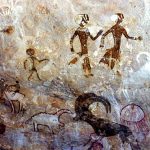To feed their hungry families, most of our ancestors went on hunting expeditions but some never returned and others were disorientated and failed to find their way back. The loss was crushing for the women waiting for them and drove some of them insane or broken-hearted. With no food, mums couldn’t produce milk to feed their babies who perished of hunger. For others the returning men was an occasion of absolute joy expressed in Hallelujah! Sadly, the biliteral root of the rejoicing is the same for “perish”.
At a time when suitable containers for holding or storing water were not sufficiently advanced, camping close to a water source was vital. In most places there would be some sources of food whether meat from hunted animals, or fruit, vegetables and roots collected by the women and children of the community in the vacinity of the settlement.
English no is from the biliteral *N’ “distant, isolated, detached.” Locations far from the settlments were “no” areas for all but the strong men of the clan. With time, the readily available sources of food become depleted and it is time to search for food nearby. Soon, the sources available in closer areas become depleted and the search has to be extended to areas further than the ability of the hunters to return the same day.
Those were anxious times for the women, children and the young men entrusted with protecting the community in the absence of the men. The longer they were absent, the more worry that can reach alarming proportion. Mums with babies have to find food, and hunger pushes the children to cry. To stop them crying the dummy was invented. The description is of an item that resembles a bottle so it could be some sort of gourds.
This is the category of the linguistic cluster ✤*HL⇆*LH (هل، له) for which some 30 extensions survived in both Akkadian and Ancient and Modern Arabic including the two roots, (*HL/*LH). If you think of the 30 words like dots, connecting them would draw the general picture or provide the headlines for the story told by the cluster.
For obvious reasons, the story is mostly told by women who remained in the settlement not men who departed to find food, although we have identified a linguistic cluster that tells the story by the who men experienced it. The fact that women have coined at least some of words in this post’s Linguistic Cluster appears to indicate that women participated in the creation of words Arabians still use today as well as Akkadians thousands of years ago.
Here are some of the words with selected meanings:
*LH
1. *LH (له): This is one of the two roots. No meanings have been found in extant dictionaries but etymology can identify some of the meanings by studying its derivatives.
2. B+*LH = blah (بله) “to lose one’s sanity due to severe anxiousness for the long absence of close men folk or relatives”.
3. T+*LH: talah (تله) “anxiousness, to make oneself busy or distracted to stop troubling thoughts”.
4. J+*LH: jalah (جله) “to ‘jalah’ a man is to stop him doing something dangerous” (we can assume this to be an action by some women to stop other anxious woman from hurting themselves because of distress for the very long absence of their sons, husbands or lovers).
5. D+*LH: dalah (دله) “broken heart due to suffering or loss of close relatives. A mum tadlah over her child is to have a broken heart over the loss of her child”. We should assume death is caused by hunger but other reasons have to be considered.
6. W+*LH: walah (وله) a) sadness; grief; b) loss of sanity due to strong fear, grief or confusion; c) a ‘waleh’ is any woman who lost her child; d) a ‘moulah’ is a man sent to the desert (to search for food).
7. *LH+j: lahaj (لهج) a) to give somebody a snack while waiting for a proper meal; b) to be deeply concerned by something; c) to wine and complain illegibly and noisily.
8. *LH+m: laham (لهم) “swallow food; eat very quickly (after extended hunger)”.
9. *LH+s; *LH+z: lahas, lahaz “an infant searching for the nipple of his mum to feed or lick”.
10. *LH+*LH: lalah (لهله) “a huge area with the potential of being lost”.
*HL
11. *HL: ‘hal’ “returned, came back, approached; to hail the return of somebody; to sing joyfully for the return of somebody” (this is part origin of ‘hallelujah’: an expression uttered in worship or as an expression of rejoicing. The other is ‘lilah’ “to Allah”).
12. A+*HL: ‘ahal’: 1) relatives; kith and kin; a populated encampment; a group of related people.
13. S+*HL: ‘sahl’ “a plane, level, an easy thing”.
14. M+*HL: ‘mahl’ “waiting, slowly”.
15. *HL+ʻ: ‘hala’ “a hysterical fear or worry”.
16. *HL+k: ‘halak’ “perished” (see 25 below).
17. *HL+a: ‘hala’ “hello!, hi!, welcome”.
18. *HL+m: ‘halam’ “food contains meat and skin of animal”.
19. In modern Arabic ‘lahhaya’ is a dummy for babies. Clearly our ancestral mums had something that functioned as a dummy for the babies to suck waiting for the return of men with food because their own hunger dried them of milk for suckling. Suggested above is a type of gourd.
The following are entries in Akkadian. It is the earliest attested Ariba (known in western academia as Semitic) language. Text fully written in Akkadian began to appear around 4,500 years ago. The roots we have identified are many thousands of years older:
20. (Ḫalālu) alālu: G. to hang, suspend Gt. to be tangled; to be allied with s.o.
21. (ḫalālu) alālu: Gt. to sing a joyful song; to boast Š. to exult, celebrate
22. ḫalālu (2): [Art → Music] to whistle;
23. ḫalālu: [Art → Music] G. to wheeze, pipe, whistle D. to make emit sound, make sound
24. ḫalāqu (Š): to help escape
25. ḫalāqu: G. to disappear, get lost; to run away, flee, escape; (Mathematics) to be unknown; to be destroyed; stat. : to be absent D. to lose; to destroy, to ravage; to banish, abolish; to allow to escape Š. to allow, help to escape
26. laḫannu: [Feeding → Cooking] bottle
27. laḫāšu: Gt. to pray in a whisper D. to whisper Dt. to whisper to oneself
28. leḫēmu: [Feeding → Cooking]: to eat ;
29. liḫšu: [Human → Speech] a whisper
Last modified: August 28, 2017



